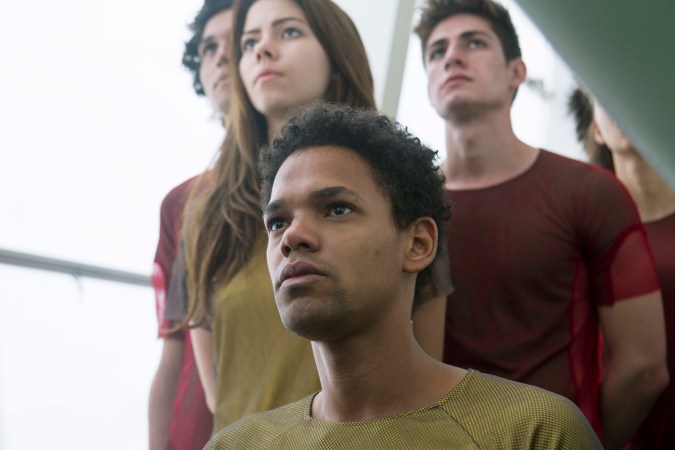Most of Brazil’s most internationally-acclaimed films about black people were not produced or directed by Black Brazilians. A white French man directed 1959’s Orfeu Negro. A white Brazilian woman and man directed City of God. A white man produced and directed the critically acclaimed Bus 174 documentary that told the back story of a black street kid who held up a Rio bus in 2001.
Fortunately, Ava DuVernay, the African American Oscar nominee behind Selma and The 13th, knows that Brazil’s black filmmaking talent runs deep. In a display of support during this worldwide coronavirus pandemic, DuVernay’s nonprofit ARRAY Now sponsored an Instagram live discussion that featured emerging Afro-Brazilian filmmakers who are ready to share their work with the world.
More than ever before, Afro-Brazilian filmmakers are producing films and documentaries that exalt the Afro-Brazilian experience. But the Brazilian film & television industry continues to lag in its inclusion of a demographic group that makes up more than 50 percent of Brazil’s 200 million people.
“They don’t think we can tell our own stories,” said Juliana Vicente during the live conversation. Vicente is a Brazilian filmmaker who directed and produced the breakthrough short film Cores e Botas (Colors & Boots, 2010). “We’re owning our own stories and telling our own stories.” In Cores e Botas, a young black girl encounters racism when she auditions to do a cover performance of her favorite television show — a successful children’s show featuring only blond girls.

A 2014 study analyzed every Brazilian feature film that was released commercially between 2002 and 2012 (226 films), and found that white men directed 84 percent of the films, and white women 13 percent. Black men made up 2 percent of the directors. There were no black woman film directors. Only three black Brazilian women have produced or directed feature-length films gained commercial distribution — Adélia Sampaio’s Amor Maldito (1984), the 2017 documentary, O Caso do Homem Errado, by Camila de Moraes and the 2018 film Café com Canela, directed by Glenda Nicácio.
The representation behind Brazil’s commercial films contrasts sharply with Brazil’s population. More than 50 percent of Brazil’s 200 million people self-identify as black or brown, and Brazil’s census considers these people negro, or black. Black women make up Brazil’s most populous demographic group, at 25.3 percent. In comparison, the U.S.’s black and Latino populations are 13 percent and 18 percent, respectively.
In the hourlong Instagram live hosted by ARRAY Now’s Mercedes Yolanda Cooper, four black Brazilian filmmakers, Vicente, Carol Rodrigues, Gabriel Martins and Joyce Prado, discussed how they create and distribute film projects that reflect their culture, history and beliefs. Martins is a member of a filmmaking collective out of Belo Horizonte that produced the feature film No Coração do Mundo. Rodrigues writes for the Netflix sci-fi thriller 3%, and she explained how she strives to make Michele, a leading black character, multidimensional. After Prado directed the first season of Empoderadas, a web series profiling black Brazilian women, she went on to become the administrative director of the Association of Black Audiovisual Professionals (APAN), which unites black filmmakers and helps.

“We need more production companies that can go after funds,” said Prado. “We need to find our way inside this industry in Brazil.”
ARRAY Now is dedicated to promoting the work of people of color and women filmmakers worldwide and has been following the work of Black Brazilian filmmakers since at least 2018 when the collective met several filmmakers at a conference in Sao Paulo. But this past March, DuVernay found her name thrown into a debate about the limited opportunities afforded to black Brazilians filmmakers.

That debate centered around who should direct and produce a narrative series about Marielle Franco, a black Brazilian councilwoman who was assassinated in March 2018. At the time, Franco was Rio de Janeiro’s only black female councilwoman, and she used her mandate to fight for the needs of underprivileged communities. Her unsolved murder sparked protests and deep mourning — especially among young black women who saw her as an inspiration. Her death even led to a new political movement among black women; at least five were elected to statewide positions in 2018.
So it was no surprise when Globo, Brazil’s largest media company, announced that it was producing a narrative television series about her life and death. Given Brazil’s history, it also wasn’t a surprise when Globo announced the producer and director, a white woman and white man respectively. There were no black writers, directors or producers — not even one black woman. When a Brazilian journalist asked why she didn’t pick a Black director, the project’s producer Antonia Pellegrino responded that if Brazil “had a Spike Lee or Ava DuVernay,” she would have picked one.
“When I heard this, I became very sad,” Sabrina Figaldo told Remezcla. Fidalgo is a filmmaker who has produced six award-winning short-films and two medium short films. Her film Rainha (Queen) has won over 20 international awards. “I felt like all this I had achieved, didn’t mean nothing to people like her. I thought about how the trajectory of black filmmakers in this country is neglected and ignored.”
After the uproar about the lack of inclusion, series producers vowed to include Afro-Brazilian women on their team.
Hopefully, Brazil’s film industry will follow ARRAY Now’s lead in promoting and nurturing black filmmakers. But even if it doesn’t, black filmmakers vow to get their work out into the world.
“We are still kind of cooking what we are preparing,” as Martins put it during the Instagram event, “but when it’s ready, it will be served well.”




